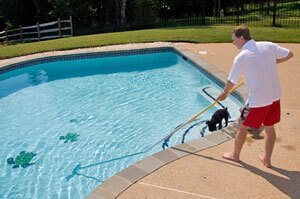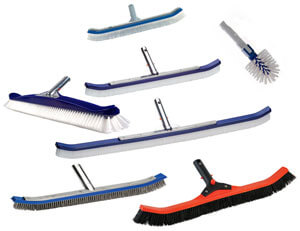FREE Standard Shipping On All Orders $100 or More!*
How to Brush a Swimming Pool
Brushing a pool, seems like such a small thing, can it fill an entire blog post?
Pool brushing, like anything has many facets, and we start with why you should brush a pool, how to brush a pool, and how often or when to brush your pool. We'll also look at the equipment, and what makes a good pool brush.
Let's Go!
WHY BRUSH A POOL?
- Prevent Scale: Pools and other bodies of water absorb particles from the outside air, which if not filtered out, settle to the bottom, and begin to build up as layers of scale film.
- Prevent Stains: Pool stains are often a mixture of dirt, minerals, oils, or from tiny metal objects in the pool. Brush the dust off the surface, where stains begin.
- Prevent Algae: Algae has a nice home in the micro-pores of a pool surface, where it finds a ready source of dusty food, and can establish a firm foothold.
- Prevent Etching: A pool that is brushed will be softer and smoother. Brushing after adding salt, calcium or pH decreaser protects the pool surface from corrosive etching.
Plus, it's good exercise for you - remember to breathe!
WHEN TO BRUSH A POOL
- After Pool Plastering: After a pool is plastered or pebbled, there is a large amount of dust that needs to be brushed and filtered, or it can stain and scale the surface. Brush twice daily for 2-3 weeks.
- After Adding Chemicals: Many powdered or granular pool chemicals don't dissolve right away when added to the pool water. Brushing helps to dissolve and disperse the chemicals so they won't etch, stain or scale the surface.
- Stain or Algae Removal: Stains and algae cannot be removed by mere pool chemicals alone, there must be some physical persuasion. Like the dinner dishes, they need a little soap and scrubbing to become clean.
Or otherwise, brush your pool weekly - for best results!
HOW TO BRUSH A POOL
 Short pole for walls, extend the pole for floor work.
Short pole for walls, extend the pole for floor work.- Brush the steps, benches and shallow end walls first.
- Brush the shallow end floor, towards the deep end drain.
- Brush the deep end walls and deep end floor last.
- Keep your back straight, and follow-thru with a long reach.
- For walls, pull in on the pole with your guide hand, to keep brush firmly against the wall.
Be consistent and thorough - brush towards the main drain! If you are brushing algae from the walls and floor, this can be some of the most difficult pool brushing. If your arms feel like they are going to fall-off afterwards - you were brushing algae correctly!
TYPES OF POOL BRUSHES
 Nylon brush bristles for all pool surfaces
Nylon brush bristles for all pool surfaces- Stainless steel brush for plaster or pebble surfaces
- 18" length is standard, 22", 24" and 36" also available
- Aluminum handle and frame adds strength and durability
- Corner brush for jets, skimmers and of course, corners!
The black bristles of our Pro 22" brush are stiffer for stronger action, and our Supreme brush has a 4" row of bristles, over 20,000! Our Deluxe pool brushes comes in larger sizes to cut your brushing time. I like the 24" brush lengths best.
CARE OF YOUR POOL BRUSH
Final Tips, store your pool brush out of the elements, in a pool storage box, or in the shed. Sun, weather and extreme temperatures can wither the bristles in time.
Replace your brush when the bristles wear down or when brushing becomes difficult. For most people, this is every 4-5 years. If you are still using (or not using) the brush that came with your pool so many years ago - step up to a new pool brush this year, and give your pool what it really wants - a weekly brushing with a good pool brush!